Audio voiceover available here for paid subscribers!
1. Insomnia & I
I’m a notoriously horrible sleeper.
When I stay at an Airbnb with my friends, morning conversation usually includes approximations of the number of times they heard me moving around or opening doors in the night. I sleepwalk about six times a year. I once walked into my undergrad roommate's room while he was sleeping and Paranormal Activity-style stared at him until he woke up screaming.
Thankfully my wife is the heaviest sleeper I’ve ever known or else we’d probably have separate beds by now.
Most of my sleep struggles are due to anxiety struggles. My ADHD essentially guarantees a perpetually racing mind. When I lay down to sleep, the inside of my eyelids look like frantic computer code conveying what went wrong that day and what might go wrong tomorrow. If I don’t fall sleep within 15-20 minutes, my heart starts pounding and my breathing gets short. And then I’m anxious because I can’t sleep and my chest beats like a dryer with shoes in it.
But I’m slowly getting better at sleep, both literally and figuratively. Rather than meeting sleeplessness with anxiety, I’m trying to see it as an invitation into prayerfully leaning on God.
2. Insomnia & You
Almost everyone struggles with sleep.
Today, Americans sleep over an hour less per night than they did last century. Over 66% of the population falls short of the ideal eight hours of sleep. 33% struggle with insomnia.1
Sleeplessness doesn’t just affect your energy; it wreaks havoc on your physiological well-being, mental health, creativity, relationships, and productivity.2
According to Matthew Walker, one of the world’s leading sleep researchers, sleep isn’t just one pillar among other pillars of health like food, water, exercise, etcetera. Instead, it’s more like a foundation that the other pillars rest on.3 It’s vital enough that in a hypothetical scenario where you had to choose between giving up food or sleep for a week while trying to remain as high functioning as possible, giving up food is the safer choice.
I’m not an expert on sleep; but from the literature I’ve read, sleeplessness seems like an unparalleled detriment to our overall health – spiritual health, included.
Professor of Christian Formation Tom Schwanda notes, “While sleeplessness does create time for fellowship with God, when it becomes persistent it often produces a lengthy list of spiritual problems.”4
Walker describes the problems in scary detail: “Routinely sleeping less than 6 or 7 hours per night demolishes your immune system, more than doubling your risk of cancer.” It’s also linked to Alzheimer’s, low blood sugar, overeating, and contributes to every known psychiatric condition, including depression, anxiety, and suicidality. Put bluntly, “The shorter your sleep, the shorter your life span.”5
Insomnia also deteriorates our ethics. An extensive study at the Center for Human Sleep Science found that the less we sleep, the more it reduces our potential to help others.6 They even attribute the annual 10% decrease in charitable giving that occurs the day after every spring’s daylight savings to the one-hour loss of sleep the night before.
All to say, I’m curious about the role of sleep in the spiritual life.
There aren’t many Christian resources on fighting insomnia. Which is kind of odd, because we spend 33% of our lives sleeping. In comparison, we spend about 0.45% of our lives having sex — and yet Christians can’t stop writing books about that subject.
So the following is my summary of everything I found on the subject. It’s genuinely helped me sleep so much better. And maybe it’ll help you too.
Very little good comes from insomnia. But we can try to rewire its lack of good into something serene by choosing to meet insomnia intentionally whenever we find ourselves tossing and turning in the night.
3. The Spirituality of Insomnia
If you suffer from insomnia, you have lots in common with lots of Christians throughout history.
Martin Luther was famously troubled by insomnia, calling sleeplessness “a torture that cannot long be endured.” Once he finally did get a few good nights of sleep, he journaled that “perhaps Satan has taken a few days vacation.”7
The Chinese church leader Watchman Nee wrote extensively on insomnia anxiety, warning his disciples against dwelling on the next day’s responsibilities before bed: “Although the believer knows that the bed is the place for sleep, and that it is not a desk where one does his thinking, the mind keeps on turning.”8 Nee also cautioned about the “bitterness of insomnia,” saying it was the enemy’s attempt to get us to blame shift our sleeplessness onto God or ourselves.
In the writer Courtney Reissig’s work on insomnia, she defined it as
a form of suffering that lays us utterly bare before the Lord. We completely depend on him to show up. Sometimes he shows up by letting us fall asleep; sometimes he shows up by stripping us of self-sufficiency, making us see that he takes weary people and sustains them even when all earthly things fail them.9
A racing mind is one of the most common roadblocks to sleep. Concerning his own insomnia, author Philip Yancey wrote, “I have tried various remedies—relaxing my body, emptying my mind, playing a noise machine—but none has worked for me. The more I concentrate on stopping my thoughts, the more they flood in like a swarm of bees. Trying to relax makes me tense.”10
Once the thoughts start, it can feel like they can’t stop. Martin Luther King Jr. noted that once he started ruminating on the enormous weight of his ministry, it was nearly impossible for him to sleep.11 Bonhoeffer similarly noted struggles to sleep while restless in prison and even wrote prayers for follow inmates to recite so they could find sleep.12
Once sleep eludes us, our thoughts risk spiraling further downward. As missiologist Stephen Neil’s insomnia became progressively worse, he reached a point where he had to start fighting suicidal thoughts.13
Which is one of the darker anecdotes of sleeplessness, but it taps into something crucial: the way sleeplessness often leads to evil, intrusive, and even demonic thoughts.
Now, I know some get semi-squeamish when demon-talk enters the periphery. I used to play a game during my master's where I would guess how many people would pull out the C.S. Lewis quote (“There are two equal and opposite errors into which our race can fall about the devils. One is to disbelieve in their existence. The other is to believe, and to feel an excessive and unhealthy interest in them.”) if demon-talk entered the discussion board. There was only one occasion where it didn’t get brought up.
I’m not under the impression that all insomnia is demonic. For example, one guy in my college small group kept asking for prayer against demonic warfare because the devil was keeping him awake. After a few weeks with no progress, we asked him about his nighttime rituals. He said that he hit the gym every night around 9pm right after taking pre-workout (which had around 300mg of caffeine) and then tried to go to sleep around 10pm.
So, yeah; not all sleeplessness is demonic warfare.
But if you’ve accounted for all the natural causes of sleeplessness and done the rudimentary steps of cognitive behavioral therapy for sleep (a branch of CBT that’s proven to boost sleep hygiene more than any known sleep medication; see footnote for more info),14 then maybe it’s time to start considering supernatural causes.
Interestingly, spiritual warfare is the historical standard for Christian theories on sleeplessness. In her book War on the Saints, the spiritual writer Jessie Penn–Lewis wrote that “Natural sleep renews and invigorates the faculties, and the whole system,” but “insomnia is, in a great degree, the work of evil spirits, adapting their workings to the over–wrought condition of the person, so as to hide their attacks under cover.”15
Puritan Thomas Sorocold even wrote a prayer specifically for warding off nocturnal evil: “Keep me in this interim from all evil and vain cognitions, from temptations of the enemy, and ungodly designs, that so long as I shall be awake, I may, as thy holy servants Paul and Silas did at midnight, meditate upon thy sacred Law and all holy things.”16
All to say: there’s no use in overdramatizing sleeplessness, but if it persists, spiritual warfare is a sturdy hypothesis for the “why” lurking behind it.
4. How to Fight Sleeplessness
On that note, there are plenty of tips and tricks Christians have dreamed up to fight insomnia, nighttime anxiety, and sleep-related spiritual warfare.
Watchmen Nee recommended that when we detect sleeplessness, the first thing we should do is surrender ourselves to God. The more we try to accomplish sleep through self-will, the more we’ll rile ourselves up. “No matter how much Satan abruptly attacks us, we will always remember that God is fighting and not us. When we behave in this way…nothing will threaten us.”17
The Roman poet Prudentius argued that pre-sleep rituals were crucial. His Hymn Before Sleep was his attempt to give others a before-bed liturgy:
When at sleep’s call thou seekest
To rest in slumber chaste,
Let first the sacred emblem
On breast and brow be traced.
The cross dispels all darkness
All sin before it flies,
And by that sign protected
The mind all fear defies.
Before trying to sleep, Teresa of Ávila would lay her body in a cross-shape as a way of surrendering her being to God.
When King Charles II couldn’t sleep, his go-to cure was listening to sermons (sorry pastors, he wasn’t just being coy; but hey, even Paul’s preaching put someone to sleep, cf. Acts 20:9).
Karl Rahner advised specific pre-sleep prayers that promoted the “untroubled, relaxed and recollected gathering together” between oneself and God.18
When the Anglican priest Tish Harrison Warren had a miscarriage, she was haunted by a grief that kept her awake in the night for hours on end. So she prayed the Compline, the “prayer in the night” from The Book of Common Prayer.19 Not having to dream up new words to pray made the Compline a kind of life jacket for whenever the nighttime felt unbearable:
Richard Baxter recommended that we fight to make sure God is the last thing on our minds before sleep: “Let your last thoughts still before your sleep be holy, and yet quieting and consolatory thoughts.” When he couldn’t sleep, he’d resort to singing the Psalms out loud (I wonder how that went over with his wife).20
Theologian Abraham Kuyper recommended that “before retiring at night, we loosen thoughts from the world by reading of the Word and by prayer to connect their thoughts to the things of the eternal Kingdom, and in lying down, before they slept, to seek fellowship with the Eternal Being.”21
For the experience of not being able to fall back asleep, poet Frances Ridley Havergal wrote, “Let us remember that he does nothing without a purpose, and that no dealing is meant to be resultless. So it is well to pray that we may make the most of the wakeful hours, that they may be no more wasted ones than if we were up and dressed.”22
Witness Lee recommended reading the Bible for at least 10 minutes before bed and then concluding with a short prayer.23 He also discouraged counting sheep in favor of reciting “Jesus is Lord.”
Other tactics get a bit more eccentric. Alice in Wonderland author Lewis Carroll, who was a math professor by day, devised a list of 72 complicated math equations that could quiet his mind whenever he couldn’t sleep. Blaise Pascal did almost the exact same thing.24
Poet Lucy Shaw would recite the Greek alphabet whenever she couldn’t sleep, reminding herself at the start and end that God was truly the alpha and omega.25
But perhaps my favorite strategy comes from the Venetian priest Lorenzo Scupoli, who practiced gratitude right before bed and right upon waking. “So take care to keep feelings of gratitude to God warm from the first moment of awakening from sleep and throughout the day, and go to sleep with words of thanks on your lips. For you are immersed in Divine blessings, one of which is sleep itself.”26 Psychologists have also noted that grateful people sleep better than ungrateful people.27
5. Drifting Off into God’s Grace
Sleep isn’t an affliction our human bodies have to suffer through. As Professor Andrew Bishop, author of Theosomnia, or “sleep theology” (yes, that’s a real thing), argues, sleep is a gift where we receive God’s grace.
Despite all the stress and weight of Jesus’ ministry, he still made space to sleep (Matt. 8:24). There’s nothing on our schedules that compares to the importance of what was on Christ’s; if He slept, there’s no reason we shouldn’t prioritize it.
Theologian Kelly Kapic even argued that sleep itself is a spiritual discipline.28 Sleep is where our bodies, minds, and hearts are most vulnerable and outside of our control. The more gracefully and faithfully we enter this kind of rest, the more space we create to receive God’s graceful rejuvenation. It’s why my wife and I prayerfully recite this line from the Quaker Thomas R. Kelly each night before trying to sleep: “Those who have the gales of the Holy Spirit go forward even in sleep.”
So now whenever I find that I can’t sleep and anxieties creep in about the next day — which ushers in the second wave of anxieties about the physical and mental toll from the lost hours of sleep — I start by reciting one of my favorite passages of Scripture:
So we do not lose heart; though our outer selves are wasting away, our inner selves are being renewed day by day. For this light and momentary affliction is preparing for us an eternal weight of glory beyond all comparison.
Then I’ll get out of bed for a bit and either kneel or sit up in a reading chair. I watch my breath and say “Lord Jesus” on the breath in, and “Have mercy on me,” on the breath out. I’ve started running through whichever tools comes to mind that I listed above: I’ll practice gratitude, pray the Compline, recite a psalm, pray against demonic thoughts. While my wife was out of town last weekend, I even improvised a horrible melody to Psalm 103 (surprisingly, it worked).
But the single thing that’s helped more than anything is mentally receiving the sleeplessness as an invitation into God’s presence rather than a shackle toward a heightened heart rate.
And if sleep still eludes me, I take that as a sign it’s probably an invitation into intercession. I start praying for anything my delirious mind can think of, but often just pray in tongues so I don’t have to push my brain to dream up new words. Eventually, a sense of peace comes and I go back to bed, close my eyes, and drift off into a deep dark rest.
I haven’t been doing this for long, but so far, it hasn’t not worked. And if it worked for me, it might work for you.
Although, the exactness of these statistics (all the stats, really) are highly debated. See S. D. Youngstedt, et al., “Has Adult Sleep Duration Declined Over the Last 50+ Years?” Sleep Medicine Reviews 28 (2016): 69–85.
These stats and more can be found in the article that inspired this one: Tom Schwanda, “When Sleep is Elusive: The Spiritual Consequences and Means Towards Coping With Insomnia,” Journal of Spiritual Formation and Soul Care, 16 no. 1 (2023): 68-88. I am not exaggerating when I say that this present article borrowed egregiously from Schwanda’s article. If you see a footnote with “S” at the end, please know I found that source in Schwanda’s article.
Matthew Walker, Why We Sleep: Unlocking the Power of Sleep and Dreams (New York: Scribner, 2017), 1-12.
Schwanda, “When Sleep is Elusive,” 68-88.
Walker, Why We Sleep, 1-12.
Eti Ben Simon, Raphael Vallat, et al. “Sleep Loss Leads to the Withdrawal of Human Helping Across Individuals, Groups, and Large–Scale Societies,” PLoS Biol 20 no. 8 (2022): 1–9, 15.
Martin Luther, Table Talk, DCCXXXVIII (Hazlitt translation), in The Table Talk of Martin Luther, ed. William Hazlitt (London: Henry G. Bohn, 1857), 316, S; Herman Selderhuis, Martin Luther: A Spiritual Biography (Wheaton, IL: Crossway, 2017), 281, S.
Witness Lee, Watchman Nee: A Seer of the Divine Revelation in the Present Age (Anaheim, CA: Living Stream Ministries, 1997), 89, 90, 91, S; Watchman Nee, The Spiritual Man, in The Collected Works of Watchman Nee, vol. 14 (Anaheim, CA: Living Stream Ministry, 1992), 528, 540, S.
Courtney Reissig, “When You’ve Given Your Troubles to God—But Still Can’t Sleep,” The Gospel Coalition, 2021, https://www.thegospelcoalition.org/article/troubles-god-cant-sleep/
Philip Yancey, Prayer: Does It Make Any Difference? (Grand Rapids: Zondervan, 2006), 186, S.
Michael A. Schuman and Anne E. Schraff, Martin Luther King Jr.: Fighting for Civil Rights (New York: Enslow Publishers, 2018), 70, S.
Dietrich Bonhoeffer, Letters and Papers from Prison, ed. Eberhard Bethge, trans. Reginald H. Fuller (New York: Macmillan, 1971), 347.
Dyron B. Duaghrity, A Worldly Christian: The Life and Times of Stephen Neill (Cambridge: Lutterworth Press, 2022), 84, 176, 198, 205, 241, S.
Jessie Penn–Lewis, War on the Saints (New York: Thomas E. Lowe, Ltd., 1994), 153, S.
Thomas Sorocold, Supplications of the Saints: A Book of Prayers (London, I. D.: 1630), 82, S.
Nee, The Spiritual Man, 717–718, S.
Karl Rahner, “A Spiritual Dialogue at Evening: On Sleep, Prayer, and Other Subjects” in Theological Investigations, vol. 3 of The Theology of the Spiritual Life (London: Helicon Press and Darton, Longman & Todd, 1967), 232, S.
Tish Harrison Warren, A Prayer in the Night: For Those Who Work or Watch or Weep (Downers Grove, IL: InterVarsity Press, 2021).
Richard Baxter, Christian Directory, 407, S; Beth Quitslund, “Singing the Psalms for Fun and Profit” in Martin and Ryrie, Private and Domestic Devotion, 244, S.
Abraham Kuyper, When Thou Sittest in Thine House, translated by John Hendrik De Vries (Grand Rapids, MI: Eerdmans, 1929), 34, S.
Frances Ridley Havergal, Royal Bounty or Evening Thoughts for the King’s Guests(Swengel, PA: Reiner Publications, 1975), 120–123, S.
Witness Lee, “Messages Given to the Working Saints” in The Collected Works of Witness Lee, 1998, vol. 2 (Anaheim, CA: Living Stream Ministry, 2017), 388, S.
Schwanda, “When Sleep is Elusive,” 68-88.
Luci Shaw, “Berceuse” in The Generosity (Brewster, MA: Paraclete Press, 2020), 50, S.
Lorenzo Scupoli, Unseen Warfare: The Spiritual Combat & Path to Paradise, ed. Nicodemus of the Holy Mountain and Theophan the Recluse (Crestwood, NY: St Vladimir’s Seminary Press, 2000), 237, S.
Alex M. Wood, S. Joseph, J. Lloyd, & S. Atkins, “Gratitude Influences Sleep Through the Mechanism of Pre-Sleep Cognitions,” Journal of Psychosomatic Research 66 no.1 (2009): 43–48.
Kelly M. Kapic, You’re Only Human (Grand Rapids: Brazos Press, 2022), 217; see also Jason McMartin, “Sleep, Sloth, and Sanctification” Journal Spiritual Formation and Soul Care 6, no. 2 (2013): 262, 263, 265, 266.



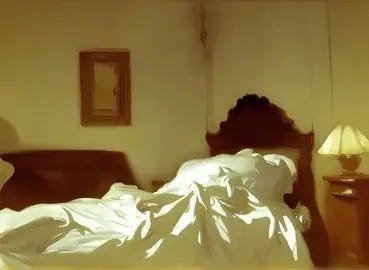
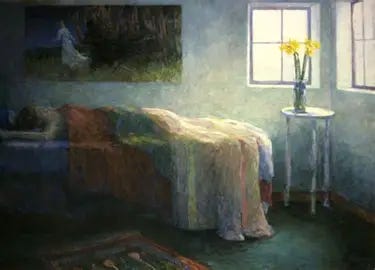
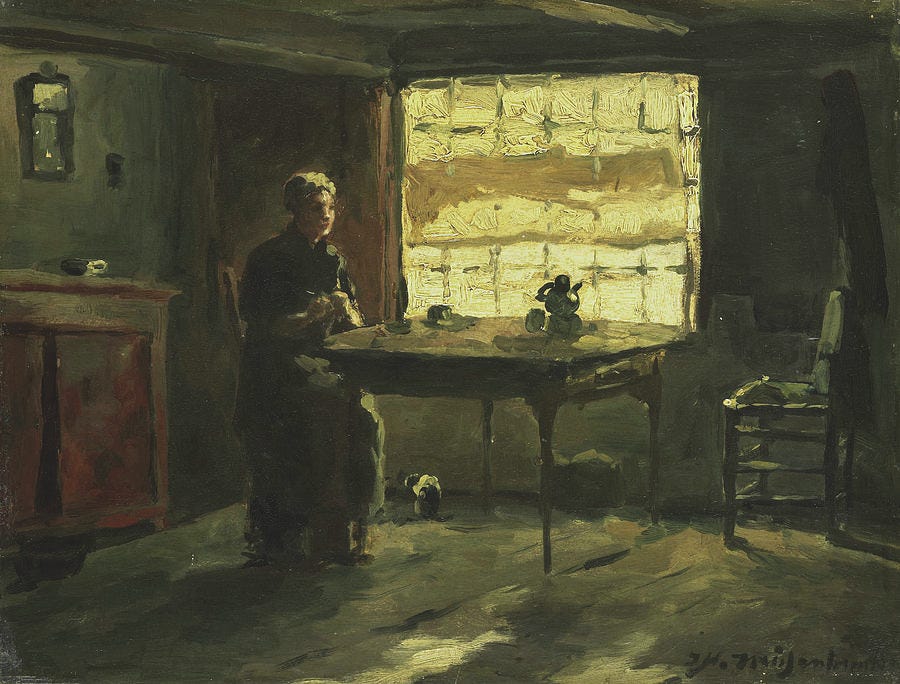

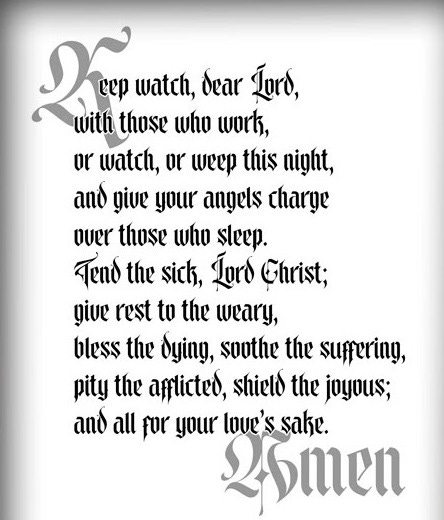

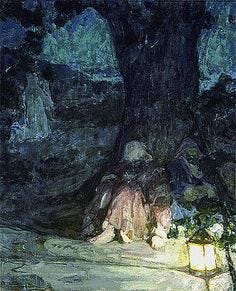
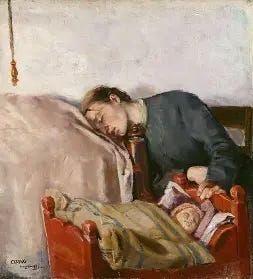
I love the list of sleep remedies - I especially love the Greek alphabet idea (now if only I knew it). I have struggled with sleep a long time, as well. My husband can fall asleep in about 10 seconds and also has no problem the next day if he has less sleep than normal. When I get less than 6 or 7 hours, I'm a wreck. You can imagine how my mental health went once I had small children. It's part of why I absolutely had to stop following crunchy parenting influencers who seemed beyond blase about sleep. I put in some serious boundaries and only then did things improve! That being said, there's some inevitability to sleeplessness as a parent, and probably also if you're not! A while back I had a great opportunity to produce a piece about sleeplessness nights and the nightmares, dreams, hopes, poetry, et all they inspire. https://www.goethe.de/prj/tbp/en/eps/thn.html
Nowadays, my rituals tends to be - kids in bed no later than 830 (ideally). Phone off/devices off by 9 (unless husband and I are watching a movie). Hot shower, Gregorian or Byzantine chant, a page or two of the Gospels, 'fun' reading (only fiction at night, often something light), and I usually sleep holding a rosary and drift off saying Hail Marys in my head. I'm usually out by 11 and up by 6 and feel okay. Sleeping pills and melatonin have sometimes been necessary but I can't stand the morning grogginess so I try to avoid when I can.
Thanks for thinking on this topic, Griffin - it's important, and yes very impactful to our spiritual lives!
"Most of my sleep struggles are due to anxiety struggles." You and me both, man. I'm such a chronic insomniac that it has, on a couple occasions, affected my safety on the road. I don't understand people who can just lie down and fall asleep, but I envy them: I'm 100% in the camp of "not being able to turn my brain off" when I get into bed, whether it's general lowgrade stress about life, trying to plan for stuff that's coming up, overthinking stuff I've already done, or mounting paranoia related to nothing at all. (Anxiety is fun.) This was such a helpful post, and I loved how you reframed the conversation in terms of the spiritual life. I've been trying to work on my sleep hygiene, but I always think of it in terms of modern health culture, or future productivity--"if I don't sleep, I'll be less effective at X and Y and won't be able to do as much the next day", rather than as a human rhythm through which we can offer ourselves to God. I've started trying to 1) journal 2) practice some form of contemplative prayer (like the Examen) and then 3) read for a while before bed, (as well as cutting back on coffee 💔), and it DOES help, but it also feels like so much work for something that should just be "a normal thing that people are supposed to be able to do"?? I guess all habits are like that, though: eating well or exercising well or praying well...it does take work.